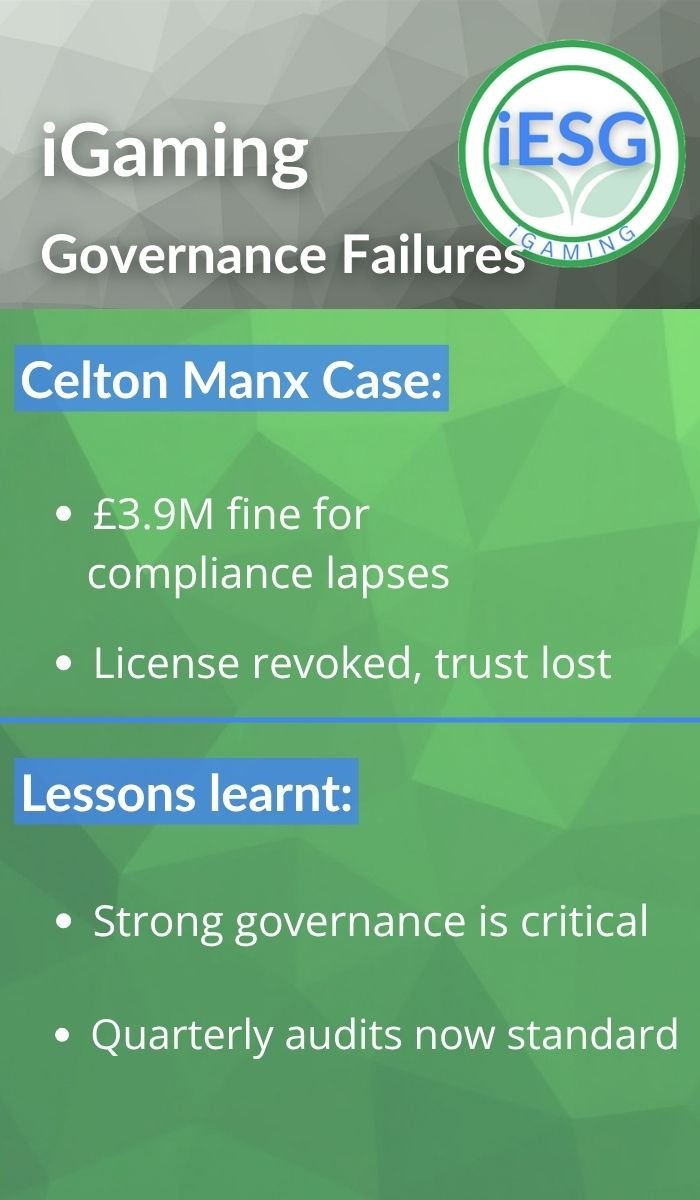iGaming governance failures are far from an abstract risk. They are now a direct threat to profits, reputations, and long-term survival for every regulated operator. The £3.9 million penalty handed to Celton Manx by the Isle of Man Gambling Supervision Commission (GSC) shows just how quickly poor oversight can escalate …
One week, you’re licensed and trading; the next, your business is facing headlines, regulator scrutiny, and public trust evaporating. In an industry built on credibility and compliance, a single lapse can change everything.
One week, you’re licensed and trading; the next, your business is facing headlines, regulator scrutiny, and public trust evaporating. In an industry built on credibility and compliance, iGaming governance failures can cost everything.
iGaming Governance Failures: What Went Wrong at Celton Manx?

Celton Manx is now a cautionary tale for the entire sector in regards to iGaming governance failures and its consequences. When the Isle of Man Gambling Supervision Commission (GSC) looked under the hood, what it found wasn’t just the odd missing document or an overlooked training session. The failures went deep …
- Touching risk management, partner oversight, and basic staff expertise.
- Monitoring barely existed. Celton Manx let its network partners and customers operate by their own rules, without holding them to the same AML/CTF standards expected of any licensed provider.
- There was no serious risk assessment. High-risk players and transactions weren’t being flagged or properly reviewed, leaving the business wide open to abuse.
- Record-keeping was all over the place. Critical reports to the Financial Intelligence Unit arrived late, and sometimes not at all, making genuine oversight next to impossible.
- The people in charge of compliance simply weren’t qualified. They lacked the training and experience needed to do the job the law demands.
- Staff training was an afterthought. Some team members never got the proper onboarding or compliance education thus such major gaps went unnoticed.
With this kind of breakdown, it’s no surprise Celton Manx surrendered its Isle of Man license before the investigation wrapped. The original penalty was even steeper: £5.6 million. But the company’s cooperation earned a 30% reduction. Even so, the brand is now synonymous with iGaming governance failures and regulatory scrutiny.
💡 In cases like Celton Manx, regulatory escalation wasn’t triggered by a single lapse but by repeated failures across governance controls, risk management, partner oversight, and staff competence. The iESG Assessment is designed to identify these compounding governance patterns early and before they culminate in enforcement action or license loss.
The Isle of Man’s Regulatory Response: Raising the Bar for Governance
The GSC didn’t mince words: there’s no room for slip-ups in governance failures in iGaming. Especially when it comes to AML and CTF. Regulators aren’t interested in excuses. They want proof that strong systems, a trained team, and full control over compliance are properly set up..
This is bigger than one company or one country. From the Isle of Man to Malta and the UK, regulators are upping their game. Operators treating compliance as a box-ticking exercise are being left behind. The ones who get ahead are proactive. They are the ones that are ready for audits, not scrambling to catch up. If you’re unprepared, you’re at risk. It’s that simple.
The Risks: How Governance Failures in iGaming Threaten Trust and Market Access
Here’s the reality: in governance failures in iGaming aren’t just about the fine. It can put an entire operation and its reputation on the line.
Operations can grind to a halt. If regulators pull your license (as happened with Celton Manx), you’re out of the market instantly. Contracts, partnerships, and player relationships can all go up in smoke.
Investors and ESG-focused partners take note. Today, no one is funding or acquiring companies that can’t prove rock-solid governance. Weak compliance means higher capital costs and fewer growth opportunities.
Players are watching. Modern gamblers, especially younger ones, want to know they’re playing with a responsible brand. If trust breaks down, customers have plenty of alternatives.
The days of quiet enforcement are over. When a regulator takes action, the world hears about it. And so do stakeholders. In this environment, simple box-ticking compliance leads to governance failures in iGaming and this is a crucial risk. Real governance is a competitive advantage.
Strengthening iGaming Governance: Practical Steps for Operators
The Celton Manx case offers a blueprint of what not to do and how severce governance failures in iGaming look. But it’s also a wake-up call and an opportunity for operators to step up. The name of the game is setting new standards:
- Compliance has to be turned into a habit, not a headache. Leaders should build regular risk checks and honest accountability into the company routine; not just for audits, but as an everyday discipline.
- Compliance teams need to be staffed with real experts. They need to be given the freedom to challenge the status quo and push for constant improvement.
- Usage of the best tools available is key. Automated AML/CTF monitoring and tech-driven reviews can catch issues in real time, so no need to ever rely on someone noticing a problem after the fact.
- Communication has to be open. Quick and transparent with updates to regulators, teams, and partners. This shows a serious approach, not just ticking boxes.
- Partners can’t be allowed to be the weak link. Affiliates and network partners need to monitored and have to meet the same standards as set internally. Their mistakes can become a liability … a big one.
- Quarterly audits including third-party and affiliate reviews and honest ESG progress updates are no longer “nice-to-haves.” They’re the standard for a resilient, future-proof iGaming business.
It’s important to schedule quarterly internal audits, including affiliates and partners. Not doing it can have a catastrophic impact on operations up to a license revocation. To be on the safe side, publishing honest ESG updates shows regulators and stakeholders that business isn’t on shaky legs.
🏅 The iESG Certificate reflects the reality that regulatory escalation rarely stems from a single failure, but from repeated iGaming governance failures. It sets a sector-specific benchmark for how these standards should be embedded, reviewed, and evidenced to regulators and stakeholders.
Conclusion: iGaming Governance Failures
The Celton Manx case isn’t just another headline … It’s a warning for the whole industry. iGaming governance failures aren’t just about paperwork or penalties. They play out in public and can cost the license, ruin reputation, and a whole businesses’ future. In this market, strong governance does more than keep an operator out of trouble. It’s the foundation of being competitive and trusted. The operators who put compliance, transparency, and ESG at the center of their business are the ones who will stay in the game.
FAQ – iGaming Governance Failures
What are iGaming governance failures?
iGaming governance failures are lapses in leadership, controls, and risk management that undermine regulatory compliance and expose operators to AML/CTF breaches.
Why did the Isle of Man fine Celton Manx?
The GSC found systemic governance failures in iGaming. In particular AML and CTF compliance failures, including poor risk assessments, inadequate monitoring, and weak staff training.
How can operators prevent Igaming governance failures?
By building a proactive compliance culture, investing in staff training, and using advanced risk monitoring technology iGaming governance failures can be prevented.
What is the impact of AML/CTF failures in iGaming?
Penalties, license loss, reputational harm, and lost access to key markets.
Are failures in iGaming governance a growing trend?
Yes, as regulatory scrutiny increases and standards rise globally increasing the likelihood of failures in iGaming governance, leading to more frequent sanctions.
Sources:
- iGaming Business: “Isle of Man – Penalty Celton Manx“
https://igamingbusiness.com/legal-compliance/legal/isle-of-man-penalty-celton-manx/ - Isle of Man GSC: “Public Statement regarding Celton Manx Limited“
https://www.isleofmangsc.com/gambling/gsc-gambling-news/04-july-2025-public-statement-regarding-celton-manx-limited/

